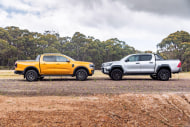
What affects fuel economy in a ute?
The rules about what affects your fuel consumption in a ute are very logical. The heavier it is, the more fuel it will use. What can you do to help?
The rules about what affects your fuel consumption in a ute are very much the same as in any other type of vehicle. The heavier it is, the more fuel it will use.
- Weight is the enemy - don’t carry too much stuff
- Check your tyre pressures
- Don’t drive like a tool
But there are some tips that can help you save cash at the servo - and I’m not talking about skipping the jumbo sausage roll and choccy milk deal. Although, hey, like I said - the less weight, the better your fuel consumption will be.
Make sure you service your vehicle on time. If you ignore the scheduled maintenance intervals for your ute, it will, inevitably, run worse, and use more fuel as a result. By making sure you have fresh oil, new filters, spark plugs that aren’t gunky, and a servicing booklet that is up to date, you will increase your chances of having a more efficient vehicle.


Also, check your tyre pressures! Running your tyres at lower pressures means you will be making it harder to get moving and keep moving, not to mention the fact that underinflating your tyres can cut their life expectancy. Research has shown that underinflation of a car’s tyres by as little as 10 per cent can increase fuel consumption by two per cent.
If your tyre placard says 32 PSI and you’re running around at off-road inflation levels (let’s say, 20 PSI), your fuel consumption could increase by as much as eight per cent.
Read this for more information: What do the numbers on my tyres mean?

If you really are concerned about fuel economy in your ute, maybe don’t fit a set of 33-inch mud tyres. More aggressive tread patterns on tyres mean there’s more friction to overcome to build and maintain momentum, which - in turn - means you’re going to use more juice.
Indeed, four-wheel-drive utes, by their very nature and with their inherent off-road capabilities, are more likely to be highly accessorised because they often double as lifestyle off-road rigs as well as work vehicles. A snorkel is, in theory, just about the only off-road mod that will help your vehicle’s efficiency, because they are designed to allow the engine to breathe better - and also, of course, to help the engine breathe and not suck in a gutful of water when you encounter a river crossing.
For that matter, any accessory that you fit to your ute is going to add some weight to it. Some of the heavier accessories people fit that should be avoided for those who really want to keep their fuel costs and consumption down include: a tool box tray (replacing the tub with a tray and fitting a tool box setup), aftermarket wheels and tyres, a bull bar, a tow bar, or a canopy.
Even a light bar, or a hard-top tonneau, a tub liner, or a set of rubber mats to protect the carpet… All of these things add weight, which ultimately adds to the load on the engine.
Further, a roof-mounted awning or roof-top tent will increase your fuel consumption, as will ladders, pipes, planks, trestles, you name it. Any items mounted on the roof or on racks above the roof height will increase the drag of the vehicle, and that’ll mean it takes more go-juice to push through the air.
Keeping your ute clean and clutter free is one easy way to help decrease your fuel use. Chuck out those wrappers and bottles. Leave stuff at the workshop or at home that you won’t need on the worksite.
Finally, one of the smartest things you can do to save fuel is to go easy on the throttle. Aggressive acceleration will increase the amount of petrol, diesel, electricity or hydrogen you use! That’s right, this is a physics thing - you will use more energy no matter what that energy source is.
If your vehicle has an “Eco Mode”, use it. If your vehicle has start-stop technology, leave it on. Those systems can save you litres of fuel per day, and that just means more money in your pocket to spend on sausage rolls and choccy milks. Oh, wait. Forget that.

More Tradie Ute Guide


